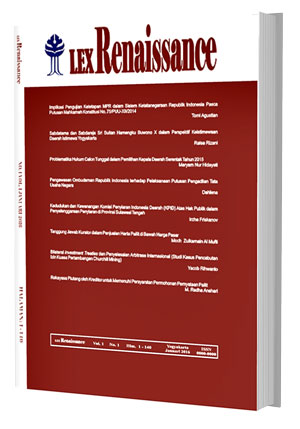Main Article Content
Abstract
Keywords
Article Details
Authors who publish with this journal agree to the following terms:
a. Authors retain copyright and grant the journal right of first publication with the work simultaneously licensed under a Creative Commons Attribution License that allows others to share the work with an acknowledgement of the work's authorship and initial publication in this journal.
b. Authors are able to enter into separate, additional contractual arrangements for the non-exclusive distribution of the journal's published version of the work (e.g., post it to an institutional repository or publish it in a book), with an acknowledgement of its initial publication in this journal.
c. Authors are permitted and encouraged to post their work online (e.g., in institutional repositories or on their website) prior to and during the submission process, as it can lead to productive exchanges, as well as earlier and greater citation of published work (See The Effect of Open Access).References
- Buku
- Ali, H. Zainuddin, Metode Penelitian Hukum, Sinar Grafika, Jakarta, 2011.
- Mahfud MD, Moh., Perdebatan Hukum Tata Negara Pasca Amandemen Konstitusi, Rajawali Press, Jakarta, 2010.
- _______, Konstitusi dan Hukum dalam Kontroversi Isu, Rajawali Press, Jakarta, 2009
- Sukardis, Beni (editor) et al, Pertahanan Semesta dan Wajib Militer: Pengalaman Indonesia dan Negara Lain, Lembaga Studi Pertahanan dan Studi Strategis Indonesia, Jakarta, 2008.
- Widjojo, Agus, dkk, Indonesia Dalam Transisi Menuju Demokrasi, Lembaga Studi Agama dan Fisafat, Yogyakarta, 1999.
- Jurnal
- Gunarta, “Haruskah Komponen Cadangan Sumber Daya Manusia Berimplikasi Pada Wajib Militer?”, Jurnal Perencanaan Pembangunan, Edisi No. 1/Tahun XVI/2010.
- Kementerian Pertahanan Republik Indonesia, “Pro Kontra RUU Keamanan Nasional”, Media Informasi Kementerian Pertahanan (Wira), Edisi Khusus Tahun 2015.
- Simamora, Robby, “Hak Menolak Wajib Militer: Catatan Atas RUU Komponen Cadangan Pertahanan Negara”, Jurnal Konstitusi, Vol. 11 No. 1, 2014.
- Perundang-undangan
- Undang-Undang Dasar Negara Republik Indonsia Tahun 1945.
- Undang-Undang Nomor 39 Tahun 1999 tentang Hak Asasi Manusia; Tambahan Lembaran Negara Republik Indonesia Nomor 3886.
- Undang-Undang Nomor 3 Tahun 2002 tentang Pertahanan Negara; Tambahan Lembaran Negara Republik Indonesia Nomor 4169.
- Internet
- Kompas.com “Puteri Indonesia menjadi Tentara amerika serikat”, https://internasional.kompas.com/read/2015/03/17/09545171/Mantan.Miss.Indonesia.Jadi.Anggota.Militer.AS?page=all diakses pada tanggal 28 Januari 2019.
- Tribun Nasional, “Komposisi Program Bela Negara” https://www.tribunnews. com/nasional/2015/10/22/komposisi-bela-negara-80-persen-materi-empat-pilar-20-persen-dasar-kemiliteran diakses tanggal 28 Januari 2019.
References
Buku
Ali, H. Zainuddin, Metode Penelitian Hukum, Sinar Grafika, Jakarta, 2011.
Mahfud MD, Moh., Perdebatan Hukum Tata Negara Pasca Amandemen Konstitusi, Rajawali Press, Jakarta, 2010.
_______, Konstitusi dan Hukum dalam Kontroversi Isu, Rajawali Press, Jakarta, 2009
Sukardis, Beni (editor) et al, Pertahanan Semesta dan Wajib Militer: Pengalaman Indonesia dan Negara Lain, Lembaga Studi Pertahanan dan Studi Strategis Indonesia, Jakarta, 2008.
Widjojo, Agus, dkk, Indonesia Dalam Transisi Menuju Demokrasi, Lembaga Studi Agama dan Fisafat, Yogyakarta, 1999.
Jurnal
Gunarta, “Haruskah Komponen Cadangan Sumber Daya Manusia Berimplikasi Pada Wajib Militer?”, Jurnal Perencanaan Pembangunan, Edisi No. 1/Tahun XVI/2010.
Kementerian Pertahanan Republik Indonesia, “Pro Kontra RUU Keamanan Nasional”, Media Informasi Kementerian Pertahanan (Wira), Edisi Khusus Tahun 2015.
Simamora, Robby, “Hak Menolak Wajib Militer: Catatan Atas RUU Komponen Cadangan Pertahanan Negara”, Jurnal Konstitusi, Vol. 11 No. 1, 2014.
Perundang-undangan
Undang-Undang Dasar Negara Republik Indonsia Tahun 1945.
Undang-Undang Nomor 39 Tahun 1999 tentang Hak Asasi Manusia; Tambahan Lembaran Negara Republik Indonesia Nomor 3886.
Undang-Undang Nomor 3 Tahun 2002 tentang Pertahanan Negara; Tambahan Lembaran Negara Republik Indonesia Nomor 4169.
Internet
Kompas.com “Puteri Indonesia menjadi Tentara amerika serikat”, https://internasional.kompas.com/read/2015/03/17/09545171/Mantan.Miss.Indonesia.Jadi.Anggota.Militer.AS?page=all diakses pada tanggal 28 Januari 2019.
Tribun Nasional, “Komposisi Program Bela Negara” https://www.tribunnews. com/nasional/2015/10/22/komposisi-bela-negara-80-persen-materi-empat-pilar-20-persen-dasar-kemiliteran diakses tanggal 28 Januari 2019.




